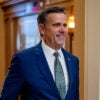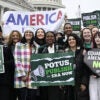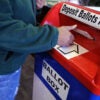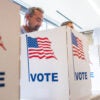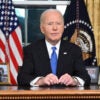Federal employees—who work on average a month less than private-sector workers and get paid more—are lobbying for higher pay.
Government unions know that Congress is looking for ways to nip and tuck the federal budget, and they’re counting on being left out of the deal.
“The Federal-Postal Coalition—a group representing more than two dozen federal employee unions—pleaded with Congress on Monday to spare their members in any deal related to the ‘fiscal cliff,’” Government Executive reports.
The Daily Signal depends on the support of readers like you. Donate now
Government unions went all out to re-elect the President—the Service Employees International Union (SEIU) spent more than any other outside group on Obama’s campaign. While only about seven out of 100 private-sector workers are unionized, in government, that number rises to 36 out of 100.
Now they’re complaining that they don’t get paid enough.
Federal employees and Members of Congress are working under a two-year “pay freeze,” though “individual employees still remain eligible for raises if they receive promotions, step increases or performance awards,” explains Government Executive.
Of course, these are employees who are paid by the taxpayers. So their compensation deserves every measure of scrutiny. Unfortunately, faulty comparisons to the private sector have been muddying the waters—something Heritage’s Jason Richwine and the American Enterprise Institute’s Andrew G. Biggs have been working to correct.
When Richwine and Biggs wrote in The Washington Post November 18 that government unions were using bogus numbers to push for raises, a firestorm of reader comments erupted. As of this morning, there were 2,480 comments on the piece.
One of the main issues: “The Federal Salary Council, an advisory body of academics and leaders of public employee unions, suggested last month that federal workers are underpaid by an average of 35 percent relative to nonfederal employees.”
What’s behind the huge gap the council is claiming? For starters, a huge omission: benefits packages. Richwine and Biggs note:
First, the pay agent doesn’t consider fringe benefits, even though benefits for federal workers are famously generous. In addition to a 401(k)-type pension with a handsome employer match, federal workers receive a traditional defined-benefit pension—for which they contribute less than 1 percent of salary—as well as retiree health coverage. A Congressional Budget Office study published in January found that the federal retirement package was 2.7 times more generous than what is paid by large private-sector firms. Federal workers also receive more paid vacation and sick days.
According to their own reporting, government employees work fewer hours than private-sector employees. To measure this in the fairest way possible, the American Time Use Survey allows workers to record all of their time, including any hours spent working from home or outside normal business hours. Using this data, Richwine found that government employees worked about one month less per year than private-sector workers.
And not only do they work less, they get paid more.
A January 2012 report by the Congressional Budget Office (CBO) showed that federal government employees receive substantially higher compensation than similarly skilled workers in the private sector. The report’s methodology and conclusions were broadly similar to previous studies from both The Heritage Foundation and the American Enterprise Institute. Richwine, Biggs, and Heritage’s James Sherk concluded:
Federal compensation should be scaled back and reallocated to reward the most productive federal workers. The government should replace the seniority system with performance pay, paying higher salaries to good workers without guaranteeing raises for mediocre performers.
Government unions worked hard to re-elect President Obama, and now they’re expecting a payout at the expense of taxpayers. Any suggestion that their pay is below market levels is completely false.
Quick Hits:
- Mediation talks between Hostess and its bakers’ union fell apart yesterday. The company will proceed with a bankruptcy hearing today.
- A new, long-awaited set of Obamacare rules was released by the Health and Human Services Department yesterday that will govern health insurance plans under the new law.
- After the owner of 30 Denny’s franchises said he was going to add an Obamacare surcharge to his menus, customers of other Denny’s restaurants around the country threatened a boycott. Now the corporate leadership is trying to explain to people that one franchisee’s opinions are not their own.
- Papa John’s Pizza founder John Schnatter is also clarifying his comments about Obamacare’s impact on his business.
- States have the option to refuse to set up a health insurance exchange for Obamacare. What happens if they do? Heritage’s Nina Owcharenko and Ed Haislmaier explain.









